Prior to this year’s FIFA World Cup, which France won last night in Moscow by defeating Croatia 4-2 in the final, I had never experienced a World Cup without my Italy.
To make matters worse, my secondary teams, USA and South Africa, also did not qualify. What would it be like to follow the most popular global cultural event as a discerning neutral observer?
Early on, the six-goal draw between Spain-Portugal, most memorable because of Cristiano Ronaldo’s hat-trick, and Mexico’s stunning 1-0 upset of Germany jolted me into pretending I was engaged in the tournament. Fox’s insipid coverage in the U.S. did little to heighten my enthusiasm. Nothing changed when I landed in Italy for the remainder of the group stage.
Italians were detached from the World Cup. Media coverage and everyday conversations were more in tune with the Serie A transfer market as well as Scuderia Ferrari’s surging fortunes in Formula 1. From the Umbrian hills to the Lazio coast, tourists and foreigners were usually the only ones I saw glued to the prime-time matches on TVs set up in piazzas and cafés.
The emotional outbursts of a group of vacationing Swedes at an eatery near our house during their rollercoaster match against Germany anticipated by thirty seconds the iPad livestream at our dinner table. That’s how we knew that the 10-man Germans had somehow won before Toni Kroos actually curled that wonderful 95th-minute free kick into the top corner [watch it here].
Senegal—the strongest African team together with Nigeria—came closest to getting me involved on a deeper level. In the build up to Senegal-Colombia, a match the West Africans needed at least to draw to qualify for the knockout stage, I was quoted in a New York Times front-page story about Senegal Coach Aliou Cissé—the lowest paid coach in the World Cup [click here for full article]. I watched that crucial game with two Senegalese street vendors at a beach establishment. When the Video Assistant Referee (the infamous VAR!) reversed a penalty that the referee had initially awarded Senegal, one of the lads calmly turned to me and said in nearly perfect Italian: “That’s no problem because God is on our side.” I did not have the courage to ask him if he still felt that way after Colombia’s late goal eliminated Senegal.
As it turned out, none of the five African teams made it to the second round—a disheartening outcome that I analyzed with Assumpta Oturu, host of KPFK’s “Spotlight Africa” program. We also discussed what changes may help African nations produce better results at future World Cups [listen here (27:08-34:42)].
The single-elimination round of 16 coincided with my return to Fox TV-land. Matches were shown in the late morning and early afternoon, but that was hardly a problem since teaching my global soccer online course absolutely required keeping a close tab on the competition. (Hard life, I know.)
By this time, the only thing mitigating my growing disinterest in Russia 2018 was the presence of so many players of African and Caribbean origin in the France, Belgium, and England squads. Arguably the most acutely insightful writing on World Cup soccer, race, immigration, and national identities appeared on the Africa Is A Country website [here and here] and in an Al Jazeera piece by David Goldblatt [here].
The day before the final I returned to the intersection of sports, culture, and politics in a Voice of America story. On Sunday, as the curtain fell on French celebrations at the Luzhniki Stadium, I headed to my campus office for a live interview with China Global Television Network (see video above) to wrap up my first, and hopefully last, World Cup as a neutral observer.
[Note: This review essay is cross-posted from idrottsforum.org.]
In an extraordinary stroke of good luck, I recently had the opportunity to read Football and Colonialism by Nuno Domingos and Following The Ball by Todd Cleveland. These well-researched scholarly histories of Africans in Portugal’s soccer empire beautifully complement each other.
 Football and Colonialism reconstructs the culture of the game in Lourenço Marques (Maputo today). A carefully edited English translation of a previously published Portuguese edition, it tethers sport to urban development and everyday life in a racially segregated city. Government records and press sources provide the bulk of the primary evidence, with oral interviews enriching the chronologically organized narrative. The book’s main objective is to demonstrate that football performances and bodily practices—from techniques and tactics to language use and fan culture—came to form an integral part of the larger colonial history of Mozambique.
Football and Colonialism reconstructs the culture of the game in Lourenço Marques (Maputo today). A carefully edited English translation of a previously published Portuguese edition, it tethers sport to urban development and everyday life in a racially segregated city. Government records and press sources provide the bulk of the primary evidence, with oral interviews enriching the chronologically organized narrative. The book’s main objective is to demonstrate that football performances and bodily practices—from techniques and tactics to language use and fan culture—came to form an integral part of the larger colonial history of Mozambique.
Football and Colonialism opens by situating itself in a growing literature on sport and leisure in African history and then outlines the book’s main themes, methodology, and structure. Chapter 2 examines the rise of organized football in the white residential areas of Lourenço Marques, where it aimed to strengthen physical education programs and reinforce white minority rule. Chapter 3 widens its ethnographic lens to incorporate black neighborhoods on the periphery of the expanding city. By the 1940s, the chapter shows, local African men had transformed football into a popular spectacle that shaped, and was shaped by, new forms of sociability and identitarianism. Chapter 4 explores a vernacular football culture defined by trickster dribblers (malabaristas), vigorous tackles (beketela), and hard-core (“diseased”) fans. Moves such as psêtu (making fun of an opponent after dribbling past him) andpyonyo (repeatedly dribbling around the same defender) captured the importance of “malice” in navigating between the Scylla of colonial racism and the Charybdis of material poverty (pp. 116, 119). Chapter 5 opens a parenthesis on the occult world of the vovô (religious specialist)—a feature of the African game that blends “traditional” agrarian beliefs and practices with “modern” urban ways and worldviews.
The game’s changing tactics and styles of play are the subject of chapter 6. This brilliant chapter explains how a range of British, Brazilian, Portuguese, and South African influences produced a cosmopolitan brand of Mozambican football inextricably linked to colonial racial hierarchies. As a result, by the late 1950s, the white “downtown” game’s modernity, speed, and efficiency stood in stark contrast to the African suburban game’s enduring preference for risk taking tactics and crowd-pleasing dribbling moves. Chapter 7 discusses the desegregation of the white league (AFLM) in the 1960s and describes how major Portuguese sides developed “feeder” clubs in Lourenço Marques to recruit exciting African talents, including Eusébio—the first African to win the European Player of the Year. A short concluding chapter underscores the contradiction of football in colonial Mozambique as a social practice that reinforced white minority rule while simultaneously creating a space in which the black majority could express aspirations for belonging, equality, and freedom.
 Following the Ball builds on these valuable insights to explore the experiences in Portugal of migrant footballers originally from Mozambique, Angola, Guinea Bissau, Cape Verde, and São Tomé and Príncipe. Using archival and oral sources, the book argues that Africans abroad were not passive victims of colonial capitalist machinations, but instead found ways to negotiate a better life for themselves on and off the pitch. The first chapter succinctly describes Portuguese rule in Africa and outlines the development of football among white settlers. The next chapter draws on Domingos’s pioneering work to examine the segregated nature of the inter-war soccer in the colonies and then turns to the reforms of the 1950s that brought more mestiços (biracial) and, for the first time, darker-skinned Africans into the ranks of white clubs (much to the detriment of African leagues).
Following the Ball builds on these valuable insights to explore the experiences in Portugal of migrant footballers originally from Mozambique, Angola, Guinea Bissau, Cape Verde, and São Tomé and Príncipe. Using archival and oral sources, the book argues that Africans abroad were not passive victims of colonial capitalist machinations, but instead found ways to negotiate a better life for themselves on and off the pitch. The first chapter succinctly describes Portuguese rule in Africa and outlines the development of football among white settlers. The next chapter draws on Domingos’s pioneering work to examine the segregated nature of the inter-war soccer in the colonies and then turns to the reforms of the 1950s that brought more mestiços (biracial) and, for the first time, darker-skinned Africans into the ranks of white clubs (much to the detriment of African leagues).
Chapter 3 shifts the narrative into high gear. Through deft use of evocative interviews, it brings out the connections between Africa and Europe. Meticulous attention is paid to both the “push” and “pull” factors that triggered the migration of white, mestiço, and African footballers to clubs in Lisbon and elsewhere in Portugal. Chapter 4 explores the countless difficulties faced by immigrant players. “We suffered a lot due to the weather and food,” Hilário recalled (p. 121) an example of how saudade (melancholy and longing for home) affected the young men. The much more competitive quality of football challenged them too, as did the prohibition on signing for clubs outside Portugal and the Salazar dictatorship’s repression.
Chapter 5 focuses on the 1960s and early 1970s and the ways in which African migrants coped with a number of sporting, social, and political obstacles. “The social bonds that African footballers cultivated and deepened,” Cleveland notes, “served to mitigate their saudades, while also lifting their spirits and helping them adjust to metropolitan life” (p. 154). In the context of rising popular protest in Portugal and of militant resistance in the colonies, this acutely insightful chapter brings into sharp relief the role of rebellious students and of Académica de Coimbra FC—“the epicenter of political radicalism” (p. 196). In 1969, for example, Mario Wilson and other Africans joined their Académica teammates in wearing black armbands in a Cup semifinal against Sporting Lisbon to show solidarity with student demonstrations against the regime. While the story ends with independence in 1975, the epilogue makes reference to Eder, a striker born in Guinea Bissau, whose game-winning goal for Portugal in the 2016 Euro final against France (in Paris in extra time) reminds us that “the myriad contributions made by these African players have, indeed, rendered Portugal a very rich nation” (p. 216).
* * *
Following the Ball and Football and Colonialism make important contributions to the fields of Sport Studies and African history. As legitimate academic studies in and of themselves, they convincingly demonstrate that the histories of Mozambican football and of African migrants in Portugal have value and deserve to be told in their own right. Both books also put multiple African voices and perspectives center stage while delineating the local and international implications of Lusophone African football’s history. In doing so, Following the Ball and Football and Colonialism help to narrow the linguistic and geo-institutional barriers that tend to separate Anglophone, Francophone, and Lusophone scholarship on Africa.
As can be expected, both books have some shortcomings. For example, Domingos’s prose suffers from too many passive verbs and painfully long sentences, and chapters 2 and 3 could have been shorter. More substantively, Football and Colonialism is short on analysis of masculinities and femininities, generational relations, and inner workings of African clubs and leagues. Cleveland’s work, on the other hand, relies so heavily on biographical portraits that it sometimes seems to articulate a theory based on anecdotes. Following the Ball also tends to gloss over cases of less successful African migrants, and treads lightly on the role of fans, club owners, sports reporters, and sponsors in shaping the history of Africans in the Portuguese game.
Despite these limitations, Football and Colonialism and Following the Ball succeed in accomplishing their stated objectives. Individually and together, these impressive books greatly deepen our knowledge and understanding of football and society in Africa and Europe. I highly recommend them to specialists and general readers interested in sport, African Studies, and globalization.
Teaching Soccer Online: 2018 Edition
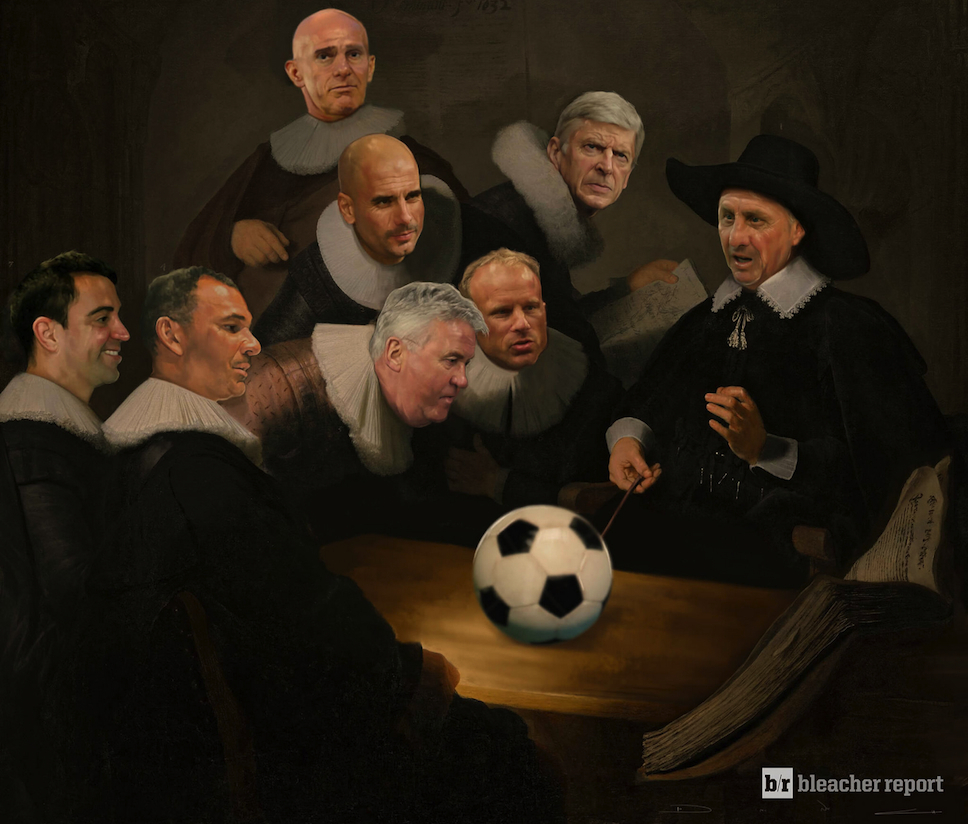
A couple of weeks ago, I was mired in grading final papers and exams when I received the first student emails about my “Global Soccer” online summer course.
“Professor,” an eager young man wrote, “I’m really excited about taking your soccer class and want to get an early start.” His enthusiasm, while obviously welcome, also raised my anxiety level. He had inadvertently reminded me that the time had come to complete the “drafty” syllabus and to quickly finish marking and submit my final grades.
A few double sessions later, the seven-week introductory course was ready to go. Using Michigan State’s D2L learning management system, students explore the relationship between soccer and social change.
A mix of academic and popular readings, lecture videos, and films take them swiftly across continents. We look at a number of topics and case studies, including: ancient ball games and the rise of association football; fan cultures and stadium disasters; the men’s and women’s game in the U.S.; soccer and politics in Brazil and Argentina; Africa’s role in globalizing the game; and the FIFA World Cup “in sun and shadow” (to borrow from Eduardo Galeano). Special attention is paid to how soccer relates to power, economic interests, and issues of race, ethnicity, class, gender, community, and nation.
When the course kicked off yesterday, enrollment had reached 150. A very healthy number! Thankfully, I have three excellent graduate assistants helping me manage the workload.
My soccer tribe (Desmond Morris docet) is made up of students drawn from 49 different majors. Business majors lead the pack (27% of the total), followed by advertising, kinesiology, human biology, geography, and chemical engineering. Smaller cohorts come from computer science, education, economics, accounting, journalism, electrical engineering, prenursing, psychology, dietetics, and packaging. Finally, there is an intriguingly long list of “lone wolves” from physics, linguistics, studio art, prelaw, neuroscience, horticulture, and more. In other words, our virtual classroom in many ways resembles a stadium crowd: a broadly representative snapshot of the larger community.
It probably doesn’t hurt enrollment that 2018 is a World Cup year and that I am teaching this course for a sixth consecutive year. Still, the overwhelming majority of students are taking it because they need the 4 General Education credits to satisfy university requirements. It helps to have an unconventional topic and the online format is also appealing. Students away from campus can continue making progress towards a degree while also working summer jobs, traveling, or simply filling time between marathons of Fortnite and FIFA 18 (the best-selling sports video game in the United States).
As an historian, I find it consistently invigorating to venture outside my disciplinary comfort zone and interact with different types of students. It’s an antidote to pedagogical predictability and stagnation and one of the main reasons why I genuinely enjoy teaching General Education classes. Even in summer!
Hamba kahle, Luyanda
By Liz Timbs and Peter Alegi
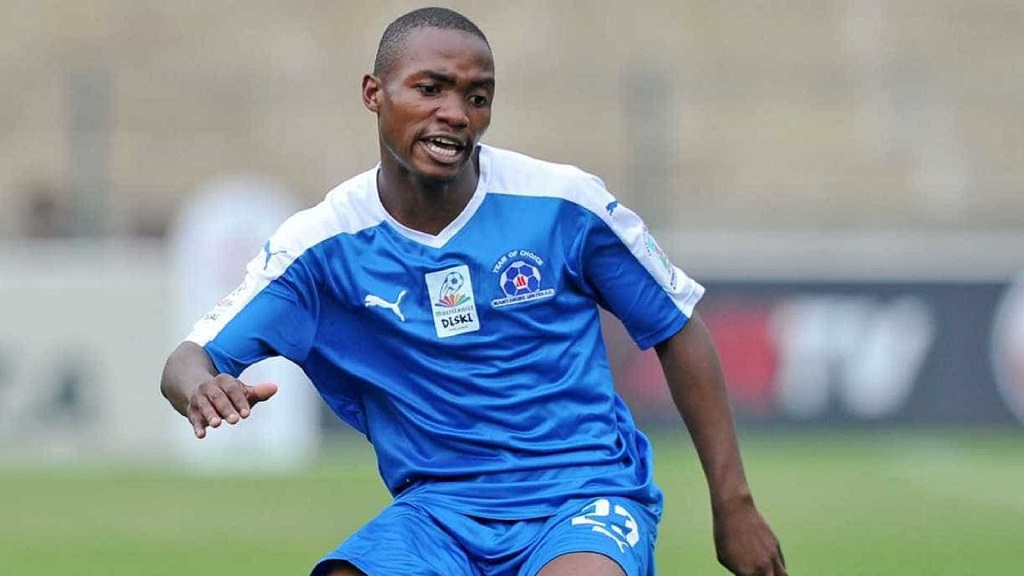
Tragically, on May 4, 2018, 21-year-old striker Luyanda Ntshangase passed away, two months after being struck by lightning during a Maritzburg United friendly. Football Is Coming Home extends our most heartfelt condolences to the Ntshangase family.
The funeral service will take place at Alan Paton Hall, Maritzburg College, Princess Margaret Drive, Thursday, May 10, at 10am.
Listen to Luyanda’s 2016 interview with Liz Timbs, in which he spoke matter-of-factly and powerfully about what mattered to him most in life and football, his hopes and dreams for the future.
At this time of sadness and grief, it is important to hear his passion, focus, and dedication to the game. Not only have Pietermaritzburg and South Africa lost a talented striker, but also a young man of great character and boundless promise.
Hamba kahle, Luyanda!
Struggle On, Luyanda Ntshangase
On March 1, 2018, 21-year-old Maritzburg United striker Luyanda Ntshangase was struck by lightning during a friendly match. He is in a medically induced coma and remains in critical, but stable condition. Our thoughts and prayers are with Ntshangase and his family in the hope of a speedy and full recovery.
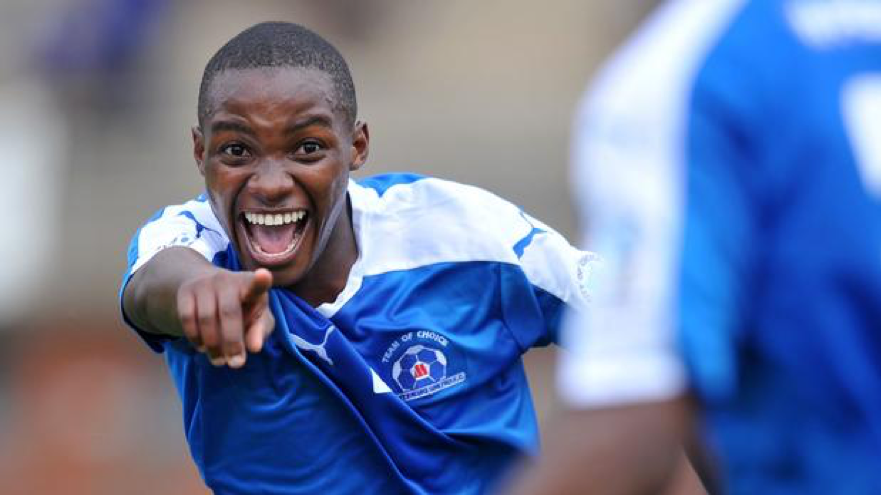
I met Luyanda Ntshangase in 2013 when I began to work with Izichwe Youth Football Club in Pietermaritzburg, South Africa. A self-proclaimed “local boy,” Ntshangase was born on January 25, 1997. He was raised in Imbali (Zone 2), an apartheid-era township outside Pietermaritzburg.
Like many South African boys, he began playing football at age six with his friends in the neighborhood. By age eight, he knew that he wanted to play the game for the rest of his life. His parents supported this dream, driving their son to training sessions, watching games, and providing critical support at home.
He joined Izichwe, named after Shaka Zulu’s regiment, in 2012. Though Ntshangase initially struggled to catch up with the other players who had been with Izichwe since 2010, he quickly adjusted and became a cornerstone of the team. He exemplifies everything that Izichwe stands for: “honesty, integrity, working hard, pushing yourself at all times . . . discipline, hard work.”
When I observed practices, Ntshangase stood out for his extraordinary focus and drive. He pushed himself and, by example, inspired his teammates to strive for their best at every training session. This talent and work ethic afforded Ntshangase the opportunity to train with the KZN Football Academy and play a key role for his team in major youth tournaments such as the Nike Manchester United Premier Cup.
Luyanda also excelled in the classroom. The Izichwe coaches’ insistence on educational success made him “realize there is a lot more to life than just football, you know, there is also school–just getting better that side also.” After matriculating from Maritzburg College, a prestigious boys’ secondary school founded in 1863 that counts Alan Paton among its alumni, Nsthangase recently enrolled for a degree in politics at the University of KwaZulu-Natal.
Balancing these responsibilities was “demanding,” he said, quickly adding that “my school and my football go together . . . There’s life after football, you know?” With a maturity well beyond his 21 years, he recognized that “to move anywhere further is to keep on working harder and grow as a person and as a footballer also.”
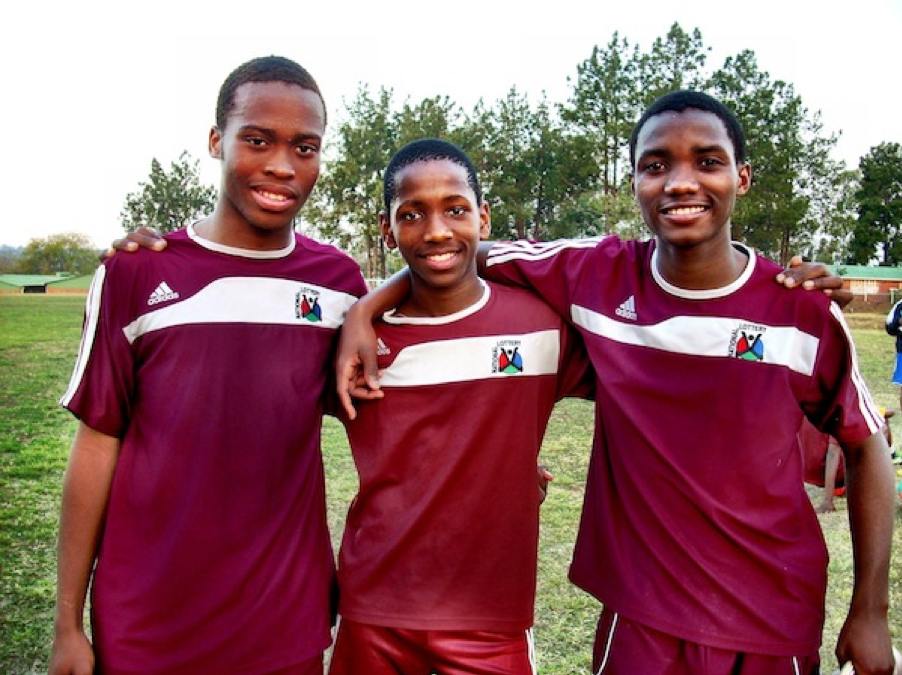
This wisdom and dedication was evident in 2016 when Izichwe played a friendly match against Maritzburg United, the local Premier Soccer League team. Ntshangase impressed head coach Ernst Middendorp, who invited him to train with his team. After a week-long training with the team, Middendorp contacted Thabo Dladla, Ntshangase’s coach at Izichwe, with the news that he wanted to offer the young striker a professional contract.
In February 2017, Ntshangase was selected for South Africa’s Under-20 national team (AmaJita). Upon receiving the news, he told the Maritzburg Fever: “I’m going to take that chance and grab it with both hands and show what I’m capable of and why I was selected. So if that opportunity comes for me–I’ll be very thankful,” he said.
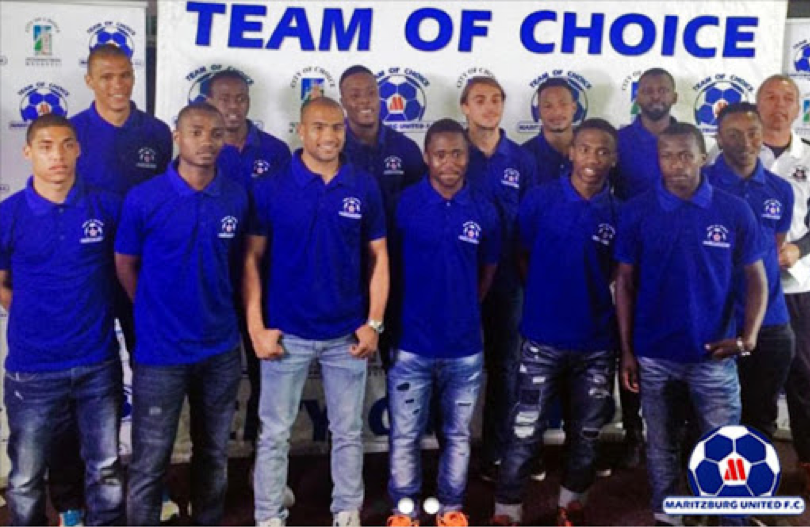
Speaking with Luyanda just a few months into his professional career, he exuded joy and certainty that there was still more to come at Maritzburg United. “[I’m] having [the] time of my life at the moment . . . it’s just the first step for me,” he said.
“I’m looking forward to building on, something bigger, better. It’s something I’ve always dreamed of [. . .]” Ntshangase continued. “I see myself in a few years being somewhere further than where I am now. It could be at another team. It could be at the same place but in a different role . . . but obviously I possibly wish to be at a bigger club or even overseas, you know? That’s where we all dream of going. So if I reach that goal that’s something I’d be very much proud of.”
Update: Tragically, on May 4, 2018, Luyanda passed away. Our heartfelt condolences to the Ntshangase family. May his soul rest in peace. The funeral service will take place at Alan Paton Hall, Maritzburg College, Princess Margaret Drive, Thursday, May 10, 10am.
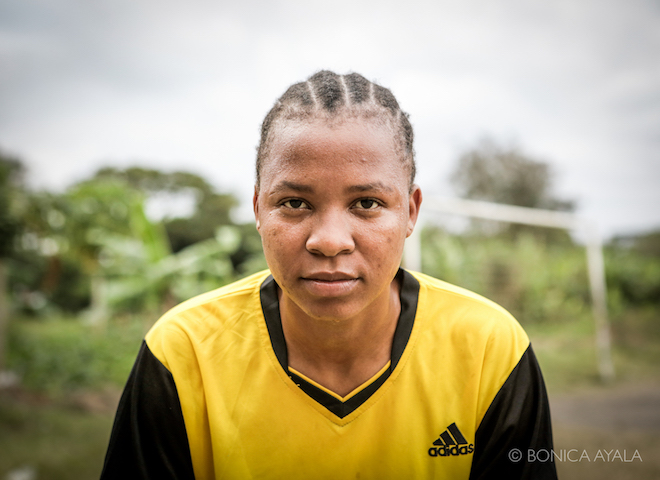
I recently went on a cinematic journey that took me from women’s soccer in Zanzibar to a failed stadium-and-entertainment complex in Buenos Aires.
My travel agency, so to speak, was the Football Scholars Forum. On February 23 it held an online discussion of two low-budget, high-return documentary films. (A recording of the event can be found here. Audio quality improves significantly around the 20 minute mark.)
“New Generation Queens” by Megan Shutzer tells the story of a Zanzibari women’s team. The documentary follows the compelling lives of younger and older women to cast light on the culture of the women’s game on the East African island, which is 99% Muslim. The 50-minute film alternates interviews with passionate players and determined organizers with footage of training sessions on rudimentary pitches. As an historian, I especially liked the remarkable 1988 footage of a Swedish team playing against a local team: the first official women’s game in Zanzibar! After the set up, the film’s main story line becomes the New Generation Queens’ journey to mainland Tanzania for a major tournament. Only the younger players participate in the Under-15 event, an important recruiting venue for the Tanzanian national side. Shaba “Messi” has a lot riding on this competition.
“Ciudad Deportiva—El Documental,” co-produced by Alex Galarza and four Argentine journalists, tells the story of Boca Juniors’ failed attempt in the 1960s and early 1970s to build a 150,000-seat stadium and recreational complex. The 45-minute documentary combines rich archival footage with still photography and interviews, to reconstruct the history of a monumental sports and urban development project. Focusing on Boca Juniors, one of the most popular clubs in the fútbol-mad city (cf. River Plate, Velez, San Lorenzo, among others), and their influential, albeit dodgy president, Alberto Armando, “Ciudad Deportiva” uncovers multiple and complex links between soccer, politics, and urban history in the mega-city of Buenos Aires.
The two enterprising film makers bring impressive academic credentials to their projects. Galarza has a PhD in Latin American History from Michigan State (where I had the distinct pleasure of serving on his doctoral committee), and is currently a Postdoctoral Fellow at Haverford College. Shutzer has a BA from Harvard, did graduate work at Stanford, is fluent in kiSwahili and works in development.
At the Football Scholars Forum, the pair explained the genealogy of their (first) films, narrative choices and production techniques, as well as approaches to film distribution. Notably, Galarza and Shutzer emphasized their commitment to collaborating closely with local people in the filmmaking process. Both spent years doing fieldwork in Buenos Aires and Zanzibar: nurturing relationships, listening to their interlocutors, building trust, and, of course, playing soccer.
The numerous differences between the films make them intriguingly complementary. “Ciudad” is a historical tale told in Spanish by men (though a female narrator) linked to one of the world’s most famous football clubs. “New Generation Queens” is a contemporary story that centers Swahili women’s voices and experiences located at the distant periphery of the global game.
I highly recommend both films. In a glut of English-language soccer media content, these documentaries stand out for their originality and production value. I also intend to use them in my classroom to challenge stereotypes about Muslim African women and to raise questions about the politics of stadium development, past and present.
The Promised Land of Leeds
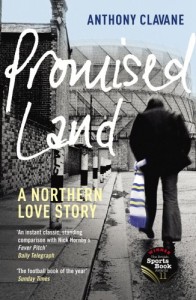 The Football Scholars Forum’s last session of 2017 took place on December 7.
The Football Scholars Forum’s last session of 2017 took place on December 7.
Author and journalist Anthony Clavane discussed his splendid book, Promised Land: A Northern Love Story, which won the 2011 UK Sports Book of the Year award.
Part memoir, part social history, part fútbology, Promised Land is as much about Leeds (the city) as it is about Leeds United (the club). In the publisher’s words: “This is a book about football. It’s about unconditional love for a club, even when it doesn’t always seem to love you back. But it is also a book about much more than that.”
The FSF discussion revolved around the themes of belonging, community, and identity. Football cannot be adequately understood, Clavane’s work shows, without thinking deeply about the social, economic, political, and cultural underpinnings of sport. Leeds and United lent themselves quite well to this kind of analysis, as they embodied broader transformations in English football and society.
Listen to an audio recording of the session here and read live tweets here.
The Football Scholars Forum’s next online gathering takes place on February 23, 2018 (2pm ET). It will explore documentary film as a medium for stories about soccer. For additional information and to participate, click here.